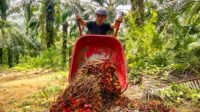PALMOILMAGAZINE, JAKARTA — The Indonesian government has officially issued a new regulation on sustainability certification for the downstream palm oil industry through Minister of Industry Regulation No. 38/2025. Signed by Minister Agus Gumiwang on 3 November 2025, the regulation marks a new phase in monitoring the sustainability of palm-based derivative products — from cooking oil and oleochemicals to other industrial raw materials.
This new rule makes it mandatory for all downstream palm oil processing companies to obtain an Indonesian Sustainable Palm Oil (ISPO) certificate. The obligation applies specifically to companies that already hold risk-based business permits under the Indonesian Standard Industrial Classification (KBLI) for downstream palm oil activities.
Under the regulation, an ISPO certificate is valid for five years and must include complete company information, geo-located production sites, product lists, supply-chain models, and an electronic mark containing a link to certification details. Companies are also required to display the ISPO logo and the electronic mark on every product packaging to ensure full transparency for consumers.
Also Read:
Firms that fail to meet these requirements may face administrative sanctions, ranging from written warnings and fines to temporary suspension of business operations.
Appeals, Complaints, and Special Audits: Strengthening Integrity
The regulation also lays out a clear mechanism for appeals and complaints during the certification process. Companies applying for ISPO certification may file an appeal to the ISPO Certification Body (LS ISPO) by submitting formal documents along with proposed solutions.
Complaints can also be lodged by government institutions, businesses, or the public with similar documentation. LS ISPO must process all appeals and complaints within a maximum of 30 working days.
In addition, the government opens the possibility for special audits outside the regular audit cycle. These special audits can be initiated by the Minister, the relevant Director General, or triggered by public complaints. Special audits may include document reviews or on-site inspections, especially in cases of major changes involving production capacity, management systems, storage facilities, mass balance, or outsourcing practices.
Lila Harsyah Bakhtiar, Director of the Fat-Based Industries, Oleochemicals, and Feed Division at the Ministry of Industry, emphasized that the appeals, complaints, and special audit mechanisms are crucial tools to safeguard the integrity of the downstream ISPO system.
“These mechanisms create healthy corrective space for both companies and the public. The goal is to ensure every certification process runs transparently, responsibly, and can be fully accounted for,” Lila said, as quoted by Palmoilmagazine.com during the Public Consultation on the Draft Regulation on Indonesian Sustainable Palm Oil Certification for the Downstream Palm Oil Industry held in Pekanbaru, Wednesday (19/11/2025).
She added that implementing downstream ISPO is a strategic step to strengthen the competitiveness of Indonesia’s palm oil sector. “With a more transparent and traceable system, our downstream industry will be better prepared to meet global market demands for sustainability,” she said.
With the issuance of Regulation No. 38/2025, the government aims to ensure that sustainability standards in palm oil derivatives are not merely formal requirements but provide real transparency for consumers, industries, and international trading partners. (P2)





































